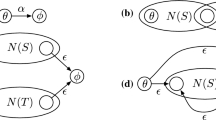Abstract
Regular expressions [4] and tools to handle them, especially tools for regular expression matching—an early one is described in the seminal paper [5] by Ken Thompson—, are one of the major achievements of formal language and automata theory. Google counts 303,000 results for “regular expressions matching” (May 4, 2011); there are numerous command line tools for working with regular expressions such as grep; Google released a regular expression C++ library not long ago [3]; almost every programming language provides support for regular expressions; and even the text editor I am using to produce the source code of this LaTeX document has an extensive regular expression library.
Access this chapter
Tax calculation will be finalised at checkout
Purchases are for personal use only
Similar content being viewed by others
References
Fischer, S., Huch, F., Wilke, F.: A play on regular expressions: functional pearl. In: Proceedings of the 15th ACM SIGPLAN International Conference on Functional Programming, ICFP 2010, pp. 357–368. ACM, New York (2010)
Glushkov, V.M.: On a synthesis algorithm for abstract automata. Ukr. Matem. Zhurnal 12(2), 147–156 (1960)
Google: Re2: a principled approach to regular expression matching (March 11, 2010), http://google-opensource.blogspot.com/2010/03/re2-principled-approach-to-regular.html (press release)
Kleene, S.: Representation of events in nerve nets and finite automata. In: Shannon, C., McCarthy, J. (eds.) Automata Studies, pp. 3–42. Princeton University Press, Princeton (1956)
Thompson, K.: Programming techniques: Regular expression search algorithm. Commun. ACM 11, 419–422 (1968)
xkcd.com: Regular expressions, http://xkcd.com/208/
Author information
Authors and Affiliations
Editor information
Editors and Affiliations
Rights and permissions
Copyright information
© 2011 Springer-Verlag Berlin Heidelberg
About this paper
Cite this paper
Wilke, T. (2011). A Functional Program for Regular Expressions Matching. In: Mauri, G., Leporati, A. (eds) Developments in Language Theory. DLT 2011. Lecture Notes in Computer Science, vol 6795. Springer, Berlin, Heidelberg. https://doi.org/10.1007/978-3-642-22321-1_4
Download citation
DOI: https://doi.org/10.1007/978-3-642-22321-1_4
Publisher Name: Springer, Berlin, Heidelberg
Print ISBN: 978-3-642-22320-4
Online ISBN: 978-3-642-22321-1
eBook Packages: Computer ScienceComputer Science (R0)




